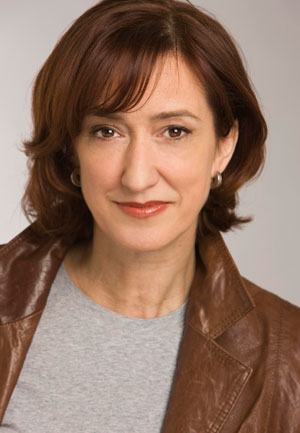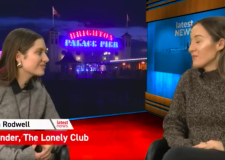Interview: Haydn seek
Haydn Gwynne, shows her considerable stage talent in Women On The Verge Of A Nervous Breakdown in the West End. Victoria Nangle finds out more …
Firstly, congratulations on your nomination. this isn’t your first Olivier nomination…
Yes, I’ve made the loser’s stage many times (laughs) for different things. I mean I’ve had some luck in a few. I think you have to go [to the awards]. There are several nominees up there, you’re very lucky, it’s such a lottery.

I mean there are loads of wonderful performances from people out there. There are always arguments over who should be in this who shouldn’t be in that. I think you have to thank your luck, it shows you’ve been noticed. You’re lucky you get the role in the first place to be honest, because for actors particularly – generally speaking, you get nominated when you’ve been given a bloody good role to play, if you know what I mean. Without being self deprecating at all, you know you need a good role – particularly in musical theatre. You also need a good song. Both Tamsin (Greig) and I here have both been nominated and got lovely roles to play, very different ones.
Where you familiar with Women On The Verge Of A Nervous Breakdown before you were cast?
No I wasn’t. I was obviously familiar with Pedro Almodóvar, not an expert on his movies by any means. And I was like; Have I seen ‘Women On The Verge Of A Nervous Breakdown’? Because I sometimes get the titles mixed up, but in fact no, I hadn’t. So I came to it fresh.
What do you think makes it continue to appeal to audiences in the 21st century because the film came out in ’88?
Almodovar’s work often works – or used to work – on two levels. On the personal, on the character, but he’s often saying something else. At the time, the Franco era was not long gone, so when the film actually came out it was also operating as a sort of metaphor for Spain. Coming out from under the tyranny, if you like, of a dictator and rediscovering its freedom and – obviously that’s not something that we’re particularly thinking about, if at all now, in England in 2015. So I think it’s really about the characters.
I mean it is a comedy. It’s a farce particularly, so that can work in any era. But certainly the characters – if the characters have any truth in them underneath the craziness – that will be relevant in any era.
There are period touches in it and a lot of the plot revolves round an answer machine. You know you can’t update it because you can get hold of everybody on their mobile phones now. And the play just wouldn’t be able to exist in a modern setting in terms of its narrative. But what’s going on with the women and all of their varying, near emotional breakdowns, hopefully is relevant today.
In my case, I’m the only character who has had a full on breakdown. She’s been locked up in a mental institution for 19 years, now she’s out and she’s suing her ex husband for deserting her 20 years earlier. And what my song is about in the second half, called ‘Invisible’, is also about the invisibility of the middle aged woman and what happens.
There’s a line in it where; ‘now things are pretty much the same as how they used to be, the young men still are smiling’ – she talks about at the beginning of the song how the young men all used to smile at her, and she says; ‘the young men still are smiling, they just never smile at me’. You know, waking up one day and suddenly everything is in the past. And where did that life go that you thought you were going to have? And.. oh. It’s gone.
And certainly the older women in the audience are very taken aback. Because it’s a rather unusual thing for a song to sing about. A little unexpected because of the way that the character is set up. It takes them aback and gives them quite a big lump in their throats. Particularly because the character has been set up very much in the comic vein up to that point and it suddenly gets a bit real. And that’s one of the pleasures of the show, that it walks this line between absurdity – and it is certainly great fun – and then with deeper more serious issues.
You’ve done a lot of stage recently in recent years. With Maxine Peake’s Hamlet getting a lot of recognition recently are there any traditional male theatre roles that you would like to approach at some point?
I’ve looked at Macbeth when I was playing Lady Macbeth years ago, and listening… as wonderful as Lady Macbeth is as a role it’s quite short and it’s kind of like pages have been torn from the book. And where her mental disintegration begins, it does work incredibly well – almost indestructibly well – (that) sleepwalking scene, that she just disappears from the play all together and when she begins to see glimpses of her conscience you know – she has four lines of doggrel!
Whereas, Macbeth, from that point on, had some of the greatest soliloquies, extraordinary! Up there with the best Shakespeare’s ever written. And I do remember standing back stage going: I’ll never play that role. so, it would be great if more of those did come my way.
I also think there are opportunities perhaps, for more crossgender casting generally. You know we often update Shakespeare, costume-wise and what have you, and budget reasons of course, but also to try and give them a feeling of relevance. But we don’t often bother to look at where we might transgender the roles, some of the supporting roles. I’d love more of that to happen.
Women On The Verge Of A Nervous Breakdown, Playhouse Theatre, London, £24.50–125,
0844 871 7615 , www.atgtickets.com
Picture: Alastair Muir





















